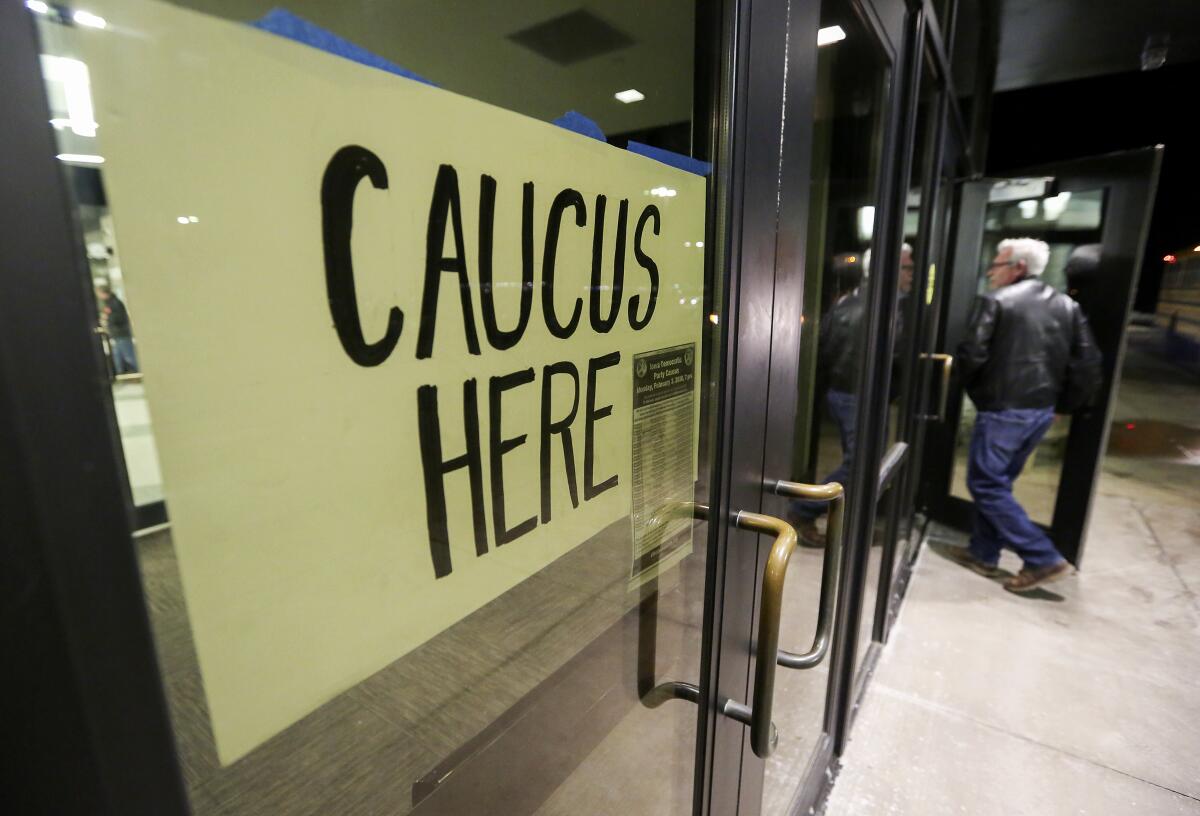Column: Iowa doesn’t represent America’s diversity. It shouldn’t set the tone for a presidential election

SACRAMENTO — California voters finally are in position to influence the nomination of a presidential candidate. But elsewhere the Democrats’ nominating process needs to be chucked.
The long-ballyhooed Iowa caucuses and the hallowed New Hampshire primary should be stripped of their first-in-the-nation privileges before the next presidential election.
These pipsqueak states have been allowed to kick off the national nominating process for far too long. Even if Iowa hadn’t booted the head count on its chaotic caucuses night, the Hawkeye and Granite states should not influence the candidates’ fates disproportionately to their small size and homogeneous population.
Both states are roughly 90% white. The nation is around 60% white.
OK, maybe size shouldn’t matter. But a representative sample of racial and ethnic voters should. There are other states of similar size with much more diverse electorates.
For example, in the West there’s Oregon, Nevada, Arizona and New Mexico. Eastern politicians would squawk that campaigning out here would be too inconvenient. Yeah, so? Western politicians have been complaining about New Hampshire’s inconvenience for decades.
In the East, South Carolina is 64% white with a large black population that dominates the Democratic electorate. Its primary is already the fourth contest in the lineup, after Iowa, New Hampshire and Nevada. So advance South Carolina a couple of steps. Or let it lead off the whole shebang with Nevada.
In the nation’s center, Oklahoma is much more diverse than Iowa. Make it one of the early contests.
And Iowa’s neighbor, Illinois, is a clone of America.
Illinois is the sixth-largest state with about 13 million people — 63% white, 17% Latino, 14% black and 5% Asian. That’s pretty close to the nation as a whole. It has “Big Shoulders” Chicago and rural life downstate — something for everybody. It’s also plenty convenient for practically any candidate.
I’d start the nominating process with the Illinois primary and be happy about it.
Enough of pampered Iowa and New Hampshire.
One can argue that despite Iowa’s lack of racial diversity, however, it started the first black president on his way to the White House. Barack Obama won there in 2008.
But I agree with Obama’s former Housing and Urban Development secretary, Julian Castro. Before dropping out of the 2020 race, he told reporters last November:
“We can’t as a Democratic Party continually and justifiably complain about Republicans who suppress the vote of people of color and then turn around and start our nominating contest in two states that, even though they take their role seriously, hardly have any people of color.”
Defenders of Iowa and New Hampshire point out that these tiny, compact states keep alive “retail” politics. Candidates discuss issues one on one with individual voters or in small groups gathered in coffee shops.
They don’t need to spend millions on TV ads like candidates do in far-flung, heavily populated California.
“Voters take the primary seriously,” says Steve Maviglio, a California Democratic strategist who grew up in New Hampshire and was elected to the Legislature there. “You can hear directly from candidates as often as you want — not through a 30-second TV ad or Facebook spot. There’s value in that for the democratic system.
“It’s not a bunch of cows in a pasture either. There’s a tech belt, old mill towns with blue-collar workers and commuters from Boston. And while it’s not ethnically diverse, voters share the same concerns as Democrats do nationally.”
Fine. But my argument is that there are other small states where the same comfy retail politics could be performed — and they’re more diverse. Give some of them a crack at being first.
And don’t remind me that New Hampshire state law requires its primary to be the nation’s first. The Democratic National Committee doesn’t have to follow that law. It could refuse to accept the primary results. The state’s delegates could be barred from the national convention.
“Certainly states that are more representative of the country’s population should be reflected in the early stages of the primary calendar,” says California Secretary of State Alex Padilla, who runs our election system.
Another reform that needs to happen is scuttling the whole caucus contraption — and not just because Iowans couldn’t count straight.
“I like the people of Iowa. They work hard at being responsible,” says Democratic strategist Bill Carrick, who has managed presidential races there. “But the truth is, you have to be able to count the results. Maybe the caucus process is just out of date. They make things too complicated. I don’t know how they survive in this era.”
I used to like caucuses. Now I don’t.
In an Iowa caucus, there aren’t secret ballots. People must commit themselves to three hours in a school cafeteria or gymnasium. It’s usually freezing outside with snow and ice. Turnout is abysmal. Many seniors and people with disabilities can’t handle it. Neither can workers on night shifts. And the whole thing is convoluted.
Just let people fill out a ballot at a polling place — or mail it in. Like in California.
Nevada has a simpler caucus system. But it also should turn to a primary because it’s more democratic.
For too many elections, California has relegated itself to the nosebleed seats and squinted at the race. Or if we were up close, the contest had practically run its course.
But on Super Tuesday — March 3 — we’ll at last be in the heat of the action with 13 other primary states. No caucuses.
More to Read
Sign up for Essential California
The most important California stories and recommendations in your inbox every morning.
You may occasionally receive promotional content from the Los Angeles Times.











